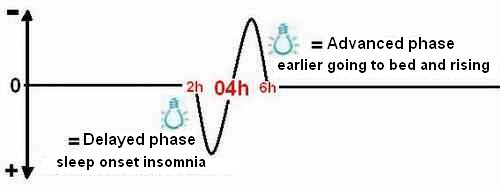Home > Welcome > Sleep-wake pathologies > Know how to sleep > Jet lag or phase shift of the traveller
Jet lag or phase shift of the traveller
Friday 14 September 2007
All the versions of this article: [English] [français]
To the West, or to the East ?
More than three weeks or less than a week?
For vacations or for work (meeting)?
What kind of sleeper are you ?. Rather a lark, or an owl ?

A few practical advices for the traveller,
to help him/her obey the underlying rules of the sleep mechanisms better
- Sleep well before leaving.
It is absolutely recommended to place oneself in the condition of having a nap in the afternoon before departure. Even if you do not sleep, it has a beneficial effect on the adaptation to your new schedules. A trip that has started in a condition of sleep insufficiency will be harder to take. - Avoid or slow down your intake of alcohol because of its harmful effect on the sleep cycles.
Take enough food and think about drinking more than usually (sleep deprivation dehydrates, you might avoid, that way, a nephritic colic or constipation).
Avoid heavy meals and choose light and well balanced meals instead.
NEW: "How to Beat Jet Lag: Don’t Eat" http://www.livescience.com/health/0... (livescience.com) - If you stay at your trip’s destination more than a couple of days, try to convince your body to stay awake and active during light hours and respect as much as possible the new time zone’s meal schedules.
If your trip lasts only one day in the new time zone, you will feel better if you remain with the same schedule as home. - Coffie can be useful, if necessary, at the arrival but one must take its action’s duration of at least 6 hours into account.
- The use of lighttherapy bulbs has been validated in the context of adapting to jetlag.

- Effect of light and sport on the sleep rythm : "phase response curve"
- Moderate exercise helps to enhance the quality of sleep and adapting to the new time zone. Its (arousing and synchronizing) effect is potentialized by phototherapy.
- Sleeping pills should only be used exceptionally. From one to three intakes can be a maximum in orderto, if necessary, «force» the body to fall asleep according to the new schedule.
Its is always best to try to anticipate on the new rythm a couple of days before leaving in order to go to sleep according to the local rythm when arriving.
The intake of a "short-acting sleeping pill" during long distance flights is an error. The sleepiness induced by medication presents numerous risks in case of troubles during the flight. Medication induced sleepiness presents numerous risks in case of troubles during the flight. The unfortunate experience of French TV presenter JL Delarue is symptomatic of the risk of mental confusion especially linked to the new molecules which have been claimed to be harmless.
NB : New well conduced studies (with airplane pilots) have shown that oral melatonin is unefficient.
Current research is about analogues to the cerebral melatonin receptors (used in insomnia and depression).
Inertia of the system : flexible or rigid ?
Whatever the individual abilities to adapt to imposed rythms are like, the internal synchronization takes several days.
In the case of a transmeridian flight that lasts longer than five hours, the phase delay phenomenon causes a desynchronization of the different internal rythms.
- * Sleep wake cycle : resetting over two days,
- * Body temperature : resetting over a week,
- * Cortisol secretion : resetting over 15 to 20 days.
The direction in which the trip takes place is very important:
- towards the West (Paris/Pointe-à-Pitre), the brain must compensate a «sun day» which is six hours longer than usual. It is necessary to delay the clocks of evening sleepiness until one reaches the new rythm. It is estimated that it takes at best one day per phase shift hour, which means 6 days for a flight towards the West Indies, for example.
The shift towards the West is quicker and better endured than in the opposite direction. - towards the East (coming back from holidays in the West Indies), the brain «looses» 6 hours over daytime and it is more difficult to shorten the pendulum’s period than to make it longer. If the subject has a tendency towards a delayed phase, it can happen that the shif occurs by making the period longer by 18 hours ! (24 - 6).
Thus, in some people, the jetlag induced by holidays in the West Indies can cause functional disorders over several months.
An animated figure of the Double Pendulum of Sleep"
An example of the chaotic movement that brutal changes like jetlag or a nightworker’s sleepdebt can induce.
Designed by G Tulloue (under Flashplayer 9). Move the cursors to modify the unstable balance of the system.
this animated figure allows to understand the fragility of the regulation system of sleep and the parameters that have to be known in order to sleep. (An enhanced version is under construction, to be followed ...)
Ms Geneviève Tulloue is a physicist, passionnate with the "transversality of concepts". Dhe has been so kind to use her skills to bring the Double Pendulum of Sleep to life. (We thank her for her generous participation). - towards the West (Paris/Pointe-à-Pitre), the brain must compensate a «sun day» which is six hours longer than usual. It is necessary to delay the clocks of evening sleepiness until one reaches the new rythm. It is estimated that it takes at best one day per phase shift hour, which means 6 days for a flight towards the West Indies, for example.

- More information...
- Viagra reduces hamster jet lag May 2007, NewScientist.com news service.
- Advices for travelling by plane (in French) (Pdf from the medical centre of advice to the travellers, Pasteur Institute of Lille).
- French Society of Chronobiology.
- Press release of the CNRS about the jetlag effect of general anaesthesia (in French) (juin 2006).
- Chronobiology in Wikipédia.
- The jetlag calculator
